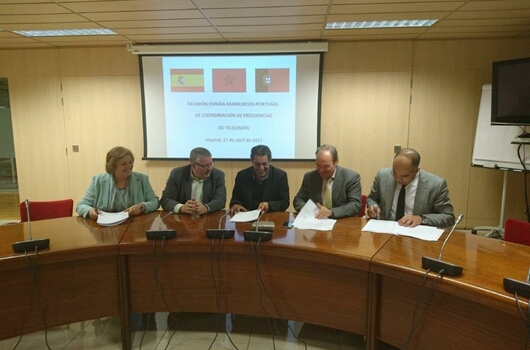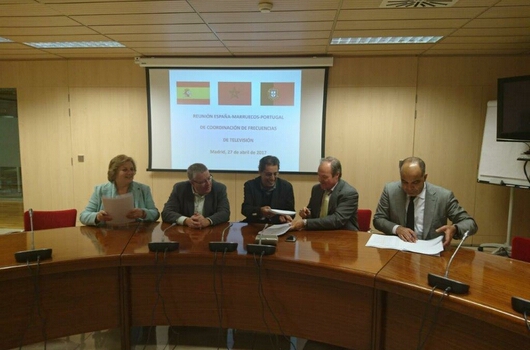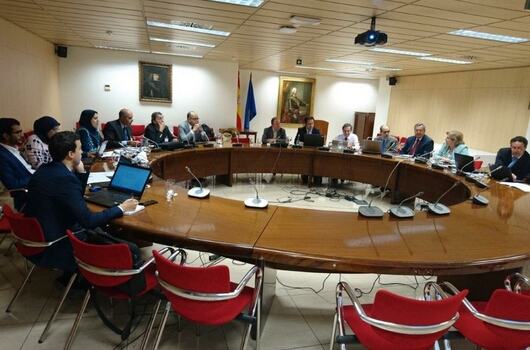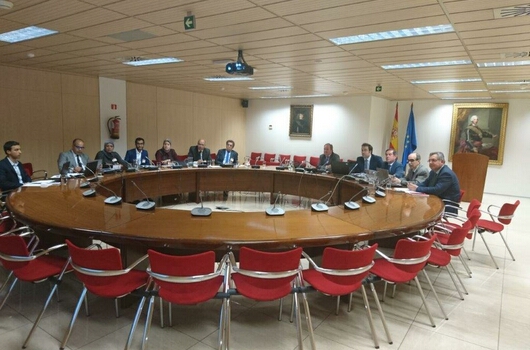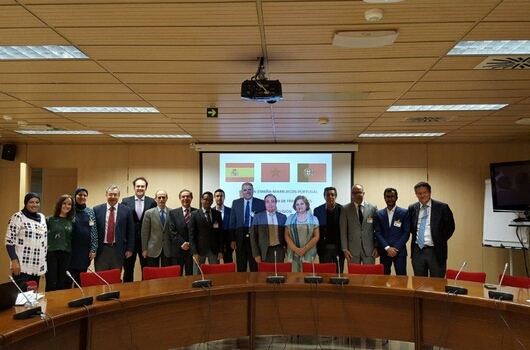HACA participates to DTT frequency coordination meeting between Morocco, Spain and Portugal
The bilateral Digital Terrestrial Television frequency coordination meeting between Morocco and Spain took place in Madrid from the 25 to 27 April 2017.
Moroccan delegation consisted of representatives of the HACA, Mr. Jamal Eddine NAJI, Director General of the Audiovisual Communication, Mrs. Mohamed HAMMOUDA, Director of Infrastructure and Technology Watch Department, Mohammed OUHADDOU and Oualid El Abbassi, senior executives in charge of frequency-planning in the same department, in addition to representatives of the ANRT, Mr. DRISSI MELYANI Sidi Mohammed, Technical Manager, Ms. Fatiha ZERGANI, Chief of international frequency coordination division, and Ms. Hind ICHER senior executive.
Spanish delegation included Mrs. Antonio Fernandez-Paniagua, Ricardo Alvarino Alvarez, Juan Pablo Hernandez Lopez, José Antonio Penaranda and Javier Riesgo Alonso representatives of State Secretariat for Information Society and Digital Agenda (SSISDA).
At the invitation of the Spanish administration, a Portuguese delegation representing the National Communications Authority (ANACOM, the telecommunications Portuguese regulator) took part in the work of the meeting’s third day with the aim of reaching an agreement on applicable planning principles to addressing common issues between the three countries.
The meeting happens to be the first in a round of frequency coordination bilateral meetings between Morocco, Spain and Portugal for DTT frequency planning within the 470-694 Mhz frequency-band.
For Morocco and Spain, the objective is to ensure for each country a planning that reaches 8 multiplexes with national coverage.
The agenda of the meeting was as follows:
- Update of DTT situation in the two countries;
- Coordination of DTT frequency requirements exposed by both parties;
- Other topics and next meeting;
- Approval of the meeting minutes and closure
As for the work of this meeting, the two countries, Morocco and Spain presented the following needs:
- For Morocco: 127 frequencies available in stations mainly located in regions bordering Spain (northern and Atlantic coast regions, areas that are usually subject to more or less controlled interferences between the two neighbouring countries);
- For Spain: 74 frequencies available to be coordinated with Morocco.
After presenting the DTT situation in their respective countries and approving coordination principles and techniques applicable to the needs expressed by each country, the two delegations have started, during the 25 and 26 April 2017 the coordination work that led to the following agreements:
- 64 frequencies for Morocco;
- 46 frequencies for Spain.
The other frequencies require, on both sides, extensive compatibility studies of which the results will be communicated via Email. The next Morocco- Spain meeting will take place in 2018.
The last meeting was held on the 27 April 2017 and attended by the Portuguese delegation according to the following agenda:
- Update of Digital Terrestrial Television situation in each of the three countries;
- DTT stations coordination;
- Planning principles;
- Geographic area of coordination between the three countries;
- Other topics;
- Approval of the meeting minutes and closure
After presenting the DTT situation in the three countries, Portugal kept abreast of coordination principles and methodology agreed between Morocco and Spain and undertook to analyze and assess their feasibility for adoption in next coordination bilateral meetings. The three Parties identified the coordination geographic area and agreed on exchanging files on technical characteristics of their stations to be subjected in future coordination meetings.
Both meetings Morocco-Spain and Morocco-Spain-Portugal ended with the signing of two meeting minutes formalizing the agreements between the three parties.

